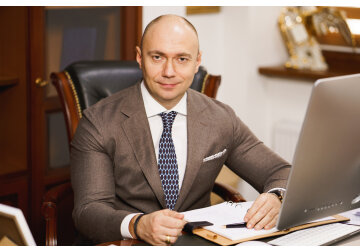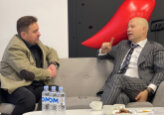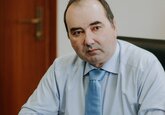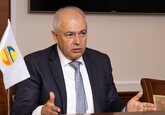
Roman ANDRONIC: "In the next two years the insurance market will be reformed."
InfoMarket Agency Interview
The reason for the meeting with the Asterra Grup CEO was the company's activity results for 2021: for the first time, it became the market leader in terms of collected insurance premiums in the general insurance market - 335 million lei, which corresponds to 17% of Moldova's insurance market. By the volume of payments the company has the second index on the market – 40.7%, behind Grawe Garat Asigurari (44,7%). Asterra Grup is also the leader in terms of assets - 407.4 million lei, second only to Moldasig (512.9 million), and there is a reason for that. Asterra Grup was created in 2006 and at the end of the last year it was the market leader, employing over 230 specialists in 70 points of sale. Roman Andronic, Asterra Grup CEO, told in an interview to InfoMarket Agency how the company works and what changes the market is expecting, including in the context of legislative amendments.
InfoMarket: What is the structure of your company's insurance portfolio and to what extent does it reflect the market situation?
Roman ANDRONIC: Our company accurately reflects the structure of the whole insurance market: about 80% is motor insurance. Half of these 80% accounts for Compulsory Motor Third Party Liability (CMTPL) and Green Card, the other half accounts for CASCO. Optional types of insurance (property, liability, aviation liability, etc.) have a small share in our portfolio.
InfoMarket: Your company collected 17% of premiums in the market represented by 11 insurance companies. Is this outcome a result of many years of labor or is it some peculiarity of your activity?
Roman ANDRONIC: The company has been existing for 15 years, it took us a long time to reach this result, but if you look at the statistics, we were building up our volumes gradually, year after year. This is probably due to our corporate segment and well chosen team of specialists. We succeeded in creating good corporate solutions, promptly reacting and thus distinguishing ourselves on the market.
InfoMarket: But the corporate segment is both the most "delicious" and the most difficult.
Roman ANDRONIC: Very difficult. The bigger the client, the more attention and individual approach it requires. Corporate client is difficult to attract and even more difficult to retain for a long time. But it is not an impossible task, and every year we increased this segment. One of the factors for the client is our payout ratio - almost 41% of premiums collected, one of the highest in the market. For the client this means that the company is paying and fulfilling its obligations. Today our corporate clients account for 55% of the premiums collected. Of course, there are more individuals in terms of number, but not in terms of volume.
InfoMarket: Judging by the fact that up to 80% of the market accounts for motor insurance, can we say that it is based on compulsory types, CMTPL and Green Card?
Roman ANDRONIC: Unfortunately, yes. We are trying to develop optional types, but they are very difficult to obtain because of the economic situation in the country: the income level of the population is quite low, so not everyone considers it reasonable to spend extra money on insurance services.
InfoMarket: But there is also agricultural insurance which is subsidized by the state at up to 70%; does it allow farmers to minimize the costs of premiums?
Roman ANDRONIC: We had both positive and negative experiences with agricultural insurance. Besides the fact that this sector is very sensitive, our farmers are not mature enough for this insurance, even despite the subsidies, because there are limits on insurance premiums depending on the area of insured farmland. The larger the area, the smaller the subsidy in real value and there is no way it comes out 70%, but much less. Therefore large farms are not very prone to such costs.
InfoMarket: Can we say that Moldova’s legislation in the field of insurance meets the requirements of the market?
Roman ANDRONIC: It has significantly improved compared to 20 years ago and is constantly changing. Our country is trying to comply with the European norms but so far only in terms of requirements and not in terms of opportunities. The rules and requirements for insurance companies are getting stricter every year, not so is the case with development opportunities.
The developers of new laws, unfortunately, are taking the best European practices only in terms of requirements and stricter market rules and are implementing them in Moldova. At the same time, the provisions that would contribute to the companies’ development are ignored, but the development opportunities of the insurance companies are very small and limited. This imbalance will create many collapses on the market in the future - this is my forecast. The market is narrowing because of the increasing requirements on capitalization, reserves, and rules of conduct for insurance companies...
For example, a few years ago there have been adopted amendments that introduced the concept of "peaceful settlement of a car accident" and the requirement to pay compensation for cars under three years old without regard to wear and tear. Just these two changes hit the CMTPL market very hard, and this type of insurance is the engine of the insurance market in our country. All customers come first for CMTPL insurance, then they buy a Green Card if necessary, and then CASCO and other optional types of insurance.
InfoMarket: The peaceful settlement of a car accident is a procedure whereby two participants in the accident do not call the police, draw up the documents by themselves, and come to the insurance company for compensation. It saves customers’ time. Is it bad for the insurance company?
Roman ANDRONIC: It increases the number and amount of payments, although the client's time is certainly saved. But previously with minor traffic accidents the parties could agree amicably and not call the police, understanding that in addition to loss of time they will have to pay fines, penalties, medical examination for alcohol or drugs... There is no way to trace this following the procedure of the peaceful settlement of a car accident. The participants of the accident can apply to the insurer on the second day, which complicates the procedures to clarify the circumstances of the accident. After the introduction of this procedure, the number of claims in cases of road accidents has increased by 30% and the volume of payments has risen accordingly.
InfoMarket: Has it affected the profitability of insurance companies?
Roman ANDRONIC: I wouldn't say that companies have any profit on CMTPL, unfortunately. All companies today are making losses on this type of insurance. But it is neither impossible to quit this type of insurance. The client gets used to getting the whole range of services he needs in one company, and if there is no CMTPL insurance - the most popular type of insurance - the client will go to a place where all issues are solved comprehensively.
InfoMarket: Nevertheless, at the end of 2021 almost all companies (except Garantie and Moldcargo) registered profit. What is the driving force behind the profitability of an insurance company in Moldova?
Roman ANDRONIC: Basically our profit is formed at the expense of investment activity. The majority gets losses from operational activity. And this is due, first of all, to CMTPL insurance - no matter how much people criticize this system, accusing companies that they allegedly do not pay indemnities. I wouldn't agree with that: companies pay very large amounts for CMTPL.
In Chisinau the CMTPL insurance for a car costs about 900 lei per year, in the regions it costs 400 lei a year, and cars from the regions often come to the capital. The losses from CMTPL insurance are estimated at hundreds of thousands of lei per traffic accident. Every quarter we prepare a report called "Technical Result". Many CMTPL companies have it between 110% and 120%. And this difference has to be covered, some from the Green Card, some from CASCO, but in the end it is still a loss.
InfoMarket: Is the Green Card or CASCO profitable?
Roman ANDRONIC: The Green Card has not entered the red zone yet. But there is a certain point there that you can apply for compensation 10 years after the accident and payments may amount to hundreds of thousands of euros. You can calculate the Green Card profit for the current moment, but in any case you need to make provisions. As for CASCO, if you apply the right client filtration system and do not insure everyone, this product can be kept in the profitable zone.
InfoMarket: So, it is the investment activity that is left. But it's limited to deposits, buying government securities and real estate. Is the central office of your company your property?
Roman ANDRONIC: We rent this building. We are giving up our assets now; we are gradually selling out all the real estate. This is due to forthcoming legislative amendments, according to which insurance companies are severely restricted from investing in real estate. If now the share of real estate in assets can be up to 35%, with the amendments that the parliament has already passed in the first reading, it will be limited to 4%. And that's not good.
I think it's a rash decision, but you can't argue with the regulator. Yes, real estate is not a highly liquid asset, but it's a fairly reliable source of investment preservation, especially in case of inflation or market crashes. In addition, existing reserves have nowhere to go, and if you have real estate, you can rent it out and get income, or save on renting space for sales outlets.
Look at what was 10 years ago on the real estate market in Moldova and what is now. Prices have risen by at least 20%, and for the insurance company investing in real estate is a tool to save money. And since they impose European practices on us, let us adopt all their experience: in different countries the limits for real estate in the reserves of insurance companies are from 10% to 20%.
In Moldova the investments in real estate will now be uninteresting for insurance companies and everyone will sell them. Last year we already sold real estate worth 15 million lei and I think that this year we will get rid of half of our facilities, without waiting for the provisions of the law to take effect.
InfoMarket: Returning to the type of insurance that you described as devouring the market - the CMTPL. In your opinion, should the CMTPL premium be liberalized so that each company calculates its own amount?
Roman ANDRONIC: It would be the right thing to do, and this is the European norm. In general, the liberalization of CMTPL is provided for in the law on motor liability and was to take effect on July 1, 2019. But what happened? Companies calculated the preliminary cost of insurance, and if the basic price was then about 700 lei, the liberalized price was 1400 lei. The National Commission for the Financial Market then decided that it could not raise the insurance cost twice in the market and adopted a decision that suspended the provisions of the law... It was a shock for everyone!
InfoMarket: This year the parliament has already adopted in the first reading the amendments to the law on motor liability insurance, but they are bypassing the issue of CMTPL liberalization.
Roman ANDRONIC: On the contrary, new notions are being introduced there, such as increasing payout limits, moral damage, and direct compensation. The latter means that the accident victim can receive compensation not from the insurance company where the accident initiator bought his insurance, but from his own insurer. After that, the insurers will collect money from each other under recourse claims. But it means that the insurer of the client who is innocent in the accident will have to pay compensation now, and get the money back in three months. And there can be problems with the recourse party approving the amount already paid at that time.
The new changes improve the consumers’ opportunities, but they will lead to the fact that in the near future, some companies will have problems, and possibly will get out of the way.
Under the current conditions with the unwillingness of the National Commission for the Financial Market to correct the situation it will be impossible to work further. If they do execute the law and introduce liberalization, then every company will calculate the premium amount by itself, and its viability will depend only on it. It will be difficult at first, but then everything will normalize. Today, however, insurance companies are self devouring. Everyone is "eating up" their own capital and reserves and trying to "dodge like a snake" in order to recruit some other customers to cover the losses from CMTPL.
In the fourth quarter of the last year we purposely refused to sell CMTPL insurance - we asked intermediaries not to sell. These sales went to another company, and it gained a rather large volume of CMTPL insurance policies, which entailed the need to form large reserves as well as large payments and is now in a difficult situation in terms of solvency requirements.
InfoMarket: And why did you give up selling CMTPL insurance at the end of the last year?
Roman ANDRONIC: We did not give up, we just asked brokers to limit the sales of our CMTPL insurance. At that time our portfolio was more than 10 million lei per month, and with a technical result of 120% we had to cover 2 million lei per month. We were forced, if possible, to reduce the sales of CMTPL insurance. Those who have collected large volumes of CMTPL insurance are greatly jeopardizing their solvency. The market conjuncture creates this edge for all.... today all companies are in this position.
InfoMarket: Do all car owners have CMTPL insurance, because it is the massiveness that should cover losses?
Roman ANDRONIC: Most car owners buy this insurance. For those who don't have it, there is a compensation fund at the National Bureau of Motor Insurers (BNAA). In general, if we conduct an experiment and make motor liability insurance voluntary for at least two months, I think that most will not insure. But then there will be difficulties between citizens in solving damage compensation. If, for example, a poor driver commits an accident and damages the owner of an expensive car, where will he get the money for compensation? I would even like such an experiment to be carried out, and then people will see that CMTPL is not someone's whim. This insurance is designed for the benefit of the consumer. What will you do if you're faced with a situation like this and you don't have insurance? Let me repeat: CMTPL is the heart of the insurance market, but at the same time it is a very complex product which devours the market from the inside.
InfoMarket: Motor liability insurance abroad for Moldovan motorists is the Green Card. And I noticed that in 2021, when crossing the border with Romania, I was never asked about this insurance.
Roman ANDRONIC: They check it extremely rarely, because after many years of experience they consider the presence of a Green Card to be something taken for granted. But if you are stopped in Romania (and there were such cases), and you do not have a Green Card, you are not allowed to drive. You will get a fine, you will be forced to buy the insurance, and until then your car will be towed to the impound lot. The penalty is so severe that if you get caught once, you'll remember it for the rest of your life. Probably, that is why the Romanian frontier guards can't understand how one can enter the European Union without the Green Card. And Murphy's Law, as you know, always works. // 13.04.2022 - InfoMarket.







